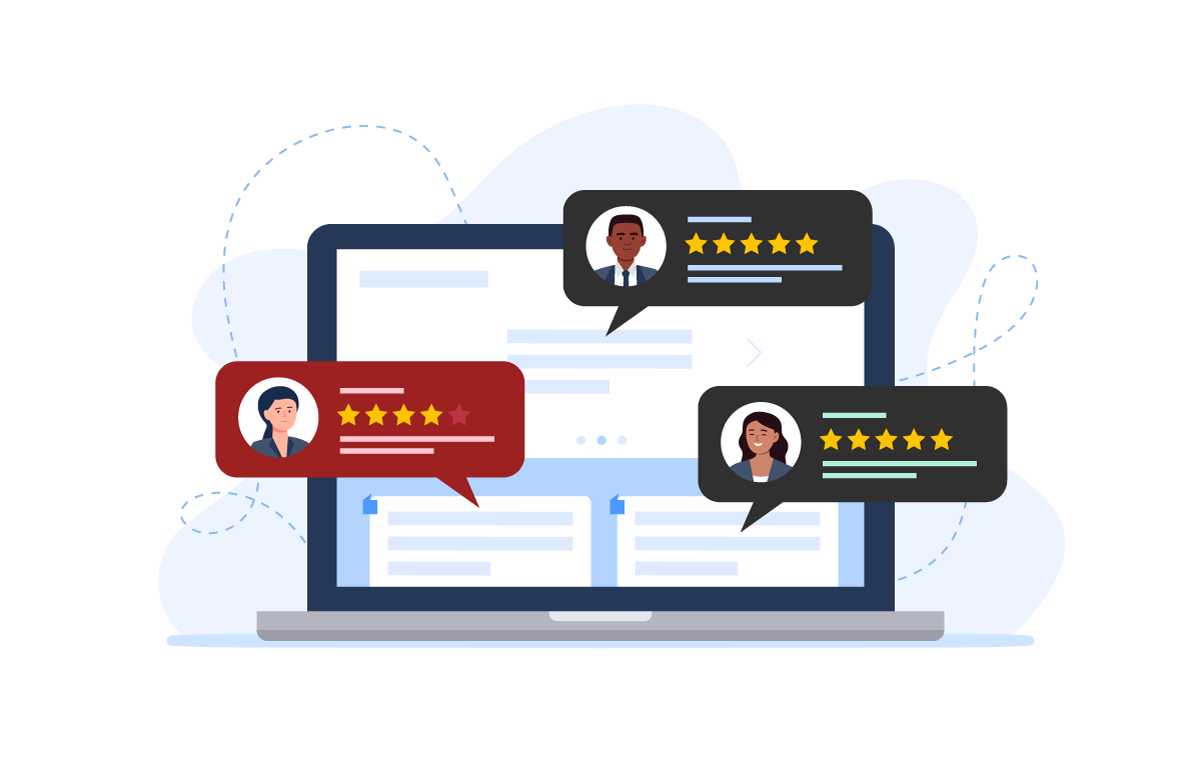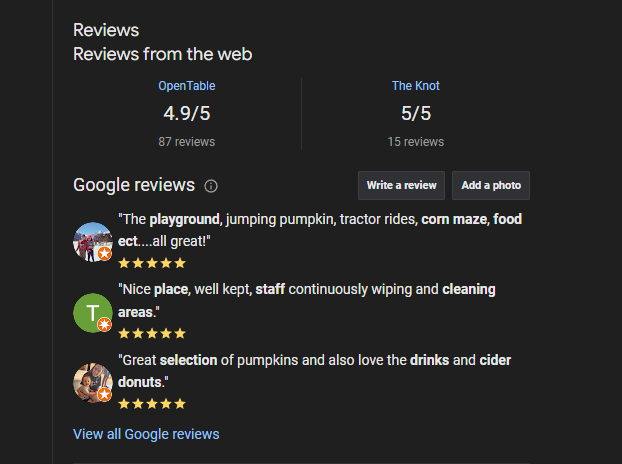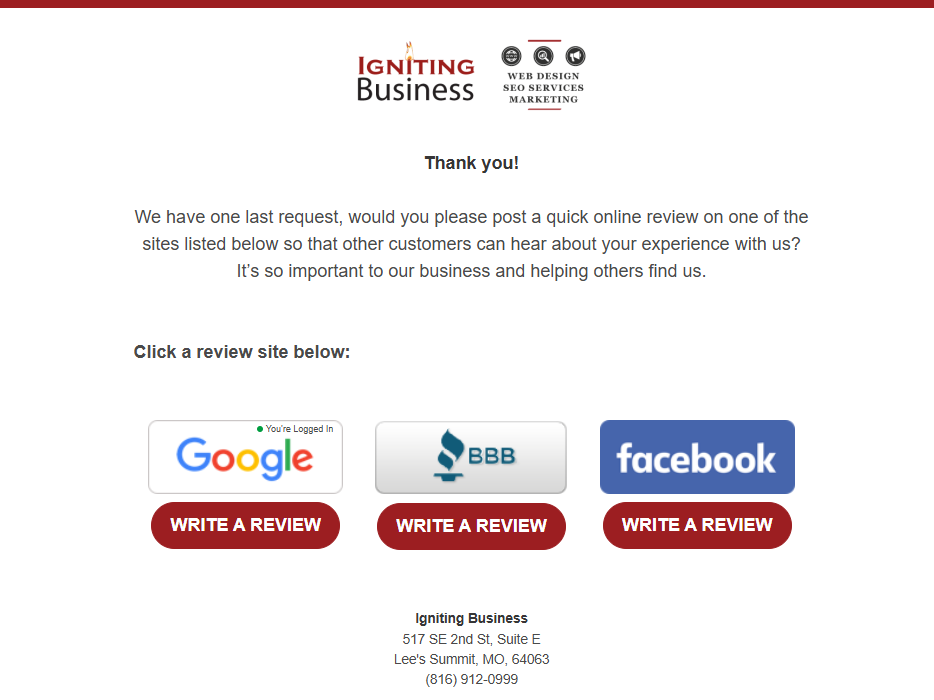Why You Should Get Reviews on More Than Just Google (Review Diversity)
When most small business owners think of online reviews, their mind jumps immediately to Google—and rightfully so. Google reviews directly influence your Google Business Profile’s visibility, which impacts how your business ranks within local searches and on Google Maps.
But here’s the catch: relying exclusively on Google for customer reviews is not only limiting your business’ credibility but also missing out on significant opportunities to build trust and generate additional leads.
Let’s dive into why review diversity—gathering customer feedback across multiple platforms—is essential for your business growth and online presence.
Table of Contents
- Different Platforms = Different User Experiences
- Let’s Be Honest - Some Customers Just Don’t Like Google
- Google Wants to See Reviews from Other Sites
- Leverage “Reviews from the Web” in Google’s Knowledge Panel
- Some AI (LLMs) Don’t Reference Google Reviews
- A One-Platform Review Profile May Feel Disingenuous to Customers
- Platform-Specific Reviews Boost Platform-Specific Rankings
- Industry-Specific Platforms Add Credibility in Niche Markets
- More Places to Leave a Review = More Trust = More Customers
Different Platforms = Different User Experiences
Each review platform has its own set of requirements for writing a review, and these differences matter more than you might think. For example, check out the different platforms listed below:
- Google requires users to have a Google account to leave a review, which may deter privacy-conscious users or those who wish to avoid Google altogether.
- Facebook reviews (or Recommendations) only work for users logged into Facebook—and only on business pages with recommendations enabled.
- Yelp has a unique and stringent filtering algorithm that sometimes hides reviews from users who aren’t active on the platform.
- Better Business Bureau (BBB) and Angi may require users to submit more detailed information before posting.
- Capterra, G2, or SoftwareAdvice (for software-based businesses) often require reviewers to verify their use of the software and ask far more technical questions.

This means some of your happiest clients may want to leave a glowing review but get blocked by a platform’s friction, policies, or simply personal preferences. By offering multiple review opportunities across multiple platforms, you allow customers to choose the one that’s easiest or most comfortable for them.
This simple move can dramatically increase your total review count.
Let’s Be Honest - Some Customers Just Don’t Like Google
I’m sure every business has heard at least one customer state, “I don’t have a Google account, and I’m not getting one!” Whether this is due to privacy concerns, a bad past experience, or simply personal preference, not everyone wants to engage with Google’s ecosystem.
By being present on multiple review sites—like Facebook, Yelp, or even niche-specific platforms—you’re giving every customer a voice. When customers feel heard and valued, they’re more likely to advocate for your business and refer others, both online and offline.
Google Wants to See Reviews from Other Sites
Ironically, even Google doesn’t want to see only Google reviews.
Google’s algorithm looks beyond its own review system to validate the trustworthiness of your company’s reputation. When reviews appear across Yelp, Facebook, Angi, TripAdvisor, Houzz, or other third-party platforms, it sends a strong signal to Google that your business is legitimate and actively engaged with customers.
Earning reviews on multiple platforms can indirectly support your local SEO rankings and improve the trust signals that Google uses to evaluate your business. It's part of the broader entity authority that Google uses to better understand your brand.
Leverage “Reviews from the Web” in Google’s Knowledge Panel
When someone Googles your business name, typically the right-hand side of the screen often shows your Knowledge Panel which can include a “Reviews from the web” section. These review snippets come from platforms like Facebook, Yelp, OpenTable, BBB, and others that Google trusts.

This section is incredibly visible and often appears even before someone clicks on your website.
In Europe, where regulators require more transparency in local listings, “Reviews from the web” are given even more real estate. Even in the U.S., this feature adds depth and visibility to your review footprint.
You can’t activate this area by piling on more Google reviews; it requires review diversification.
Some AI (LLMs) Don’t Reference Google Reviews
As artificial intelligence (AI) and large language models (LLMs), like ChatGPT, Perplexity, and Claude, grow in popularity, more people are asking them for recommendations on services, restaurants, and local businesses.
Here’s the kicker: some LLMs do not have access to real-time or direct Google reviews due to API restrictions or other policies. Instead, they may pull sentiment and feedback from other web sources like Yelp, Facebook, BBB, Reddit, and industry-specific directories.
That means if your reviews only exist on Google, your credibility may be significantly weakened on AI search platforms. Having reviews on multiple, diverse platforms helps your reputation stay accessible, especially as AI becomes a trusted advisor for consumers.
A One-Platform Review Profile May Feel Disingenuous to Customers
Hands down, Google reviews have the most impact on search engine optimization, especially within Google’s local pack. However, exclusively having Google reviews may not feel genuine to your customers.
Imagine this: you’re checking out a new restaurant, and the only reviews you can find are on Google. No social media buzz, no Yelp presence, and crickets on industry sites. That limited footprint could raise red flags, even if the Google reviews are positive. BrightLocal’s 2025 Local Consumer Review Survey states that 74% of consumers say they use two or more platforms to check reviews.
From a consumer psychology perspective, review diversity acts as social proof from multiple angles. Seeing consistent reviews across multiple platforms confirms legitimacy and increases trust.
The inverse is also true. If you're absent from multiple platforms, potential customers may wonder if your business is either inactive or hiding something.
Platform-Specific Reviews Boost Platform-Specific Rankings
If you want to rank well within Yelp’s direction website, you need reviews on Yelp. Simple, right?
The same goes for Capterra, Angi, TripAdvisor, and others. These platforms prioritize businesses in their search results based on a combination of comparative review count, average rating, frequency, and recency of reviews.
For example:
- A plumber with 10 Yelp reviews in Kansas City is more likely to show up on Yelp's local search than one with 0 reviews—even if they have 100 5-star Google reviews.
- A caterer with recent Facebook Recommendations might rank higher in Facebook search or be prominently featured within Bing and ChatGPT (which reference Facebook recommendations).
Don’t overlook the power of each platform’s internal search engine. If your ideal customers are searching on a specific platform, you need a strong reputation there too.
Industry-Specific Platforms Add Credibility in Niche Markets
Each industry typically has industry-specific websites that have specific adoption and additional visibility within search engines. The following are just a few examples of industries and their associated industry-specific review websites:
- Home services: Houzz, Angi, HomeAdvisor
- Legal: Avvo, Justia, FindLaw
- Software: Capterra, G2, SoftwareAdvice
Having reviews on niche-specific websites not only boosts visibility but validates your expertise to industry-savvy clients. In some cases, B2B buyers will trust niche sites more than general review platforms because of the vetting process involved.
More Places to Leave a Review = More Trust = More Customers
At the end of the day, diversifying your reviews is about meeting your customers where they are and catering to their preferences. Review diversity is not just an SEO trick; it’s a long-term strategy to:
- Build broader trust
- Increase platform visibility
- Future-proof your reputation for AI-based search
- And ultimately, grow your business through more credible leads
If you're unsure where to start, identify which platforms your ideal customers already use or trust. Ask them where they look for recommendations. Then, implement a simple review request system that gives them multiple options to self-select (e.g. Google, Facebook, BBB, or industry-specific sites).
Most quality Reputation Management Systems will automate this process by allowing you to input multiple review destinations, which enable your customers to self-select their preferred platform.
 Here’s an example of how Igniting Business asks for reviews from our customers while giving multiple review platform options.
Here’s an example of how Igniting Business asks for reviews from our customers while giving multiple review platform options.
Let your happy customers speak up, wherever they feel most comfortable. Your future customers, and your bottom line, will thank you.
If you’d like to receive more reputation management and SEO tips, subscribe to our free monthly newsletter.
About the author
Ben Seidel is the CEO and Founder of Igniting Business. Ben has been serving hundreds of small businesses with web design and SEO services for over 15 years and covering digital marketing related topics since 2012.
Over the years, Ben has been recognized on a local and national level, including entrepreneurship awards from both the NFIB and NASE and being featured in publications such as CNBC Universal, Yahoo News, Intuit Small Business, CIO.com, Mizzou Magazine, and Fox Business.